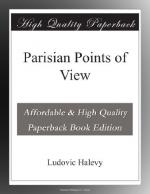“Yes, I shall go if, before I reach Marseilles, I haven’t an answer from papa; but I shall have one, for two reasons. In the first place, Papa Chamblard knows how to reason, and he will say to himself: ’What shall I gain by it? Instead of fooling round with little white women in Paris, he will fool round with little yellow ones at Singapore.’ And then another reason, the best one, is that Papa Chamblard adores me, and he can’t do without me, and the little sentimental phrase at the end of my despatch will appeal to his heart. You’ll see how it will turn out. At 11.20 my telegram will leave Laroche; papa will receive it at half-past twelve. And I’ll bet you ten louis that at Dijon or Macon I’ll find in the wire screen of the station a telegram addressed to me, and worded thus: ‘Return; no longer question of Antwerp marriage.’ Papa’s telegram will be brief, because he is saving and suppresses unnecessary words. Will you take the bet?”
“No, I should lose.”
“I think so. Have you the papers?”
“Yes.”
They read three or four papers, Parisian papers, and read them like true Parisians. It took a short fifteen minutes. While reading they exchanged short remarks about the new ministry, the races at Auteuil, and Yvette Guilbert—particularly about Yvette Guilbert. Young Chamblard had been to hear her the day before, and he hummed the refrain:
“Un fiacre allait trottinant
Cahin-caha
Hu
dia! Hop la!
Un fiacre allait trottinant
Jaune avec un cocher blanc.”
And as the light cavalryman had never heard Yvette Guilbert sing the “Fiacre,” young Chamblard threw up his arms and exclaimed: “You never heard the ‘Fiacre,’ and you had three months’ leave! What did you do in Paris? I know the ‘Fiacre’ by heart.”
Upon which Raoul began to hum again, and while humming in a voice which became more and more slow, and more and more feeble, he settled back into his arm-chair, and soon fell into a peaceful slumber, like the big baby that he was.
All at once he was waked up with a start by the stepping of the train, and by the voice of the conductor, who cried, “Ouah! Ouah! Ouah!” The cry is the same for all stations. This time it was meant for Laroche. And now for the telegram. Young Chamblard ran to the telegraph-office. The immovable operator counted the sixty-seven words of that queer despatch. “All aboard, all aboard!”
Young Chamblard had scarcely time to jump on the step of his car.
“Ouf! that’s done,” he said to the cavalryman. “Suppose we lunch.”
So they both started on their way to the dining-car. It was quite a journey, for two parlor-cars separated them from the restaurant-car, and those two cars were crowded. It was the season for the great pilgrimage of a few Parisians and a good many English towards Nice, Cannes, and Monte Carlo. The express was running very fast, and was pitching violently. One needed sea-legs. Then a furious wind beat against the train, and wrapped it in clouds of dust, making the crossing of the platforms particularly disagreeable.




